#Broad Spectrum Sunscreen for Sensitive Skin and Acne-Prone Skin
Explore tagged Tumblr posts
Text
EltaMD UV Clear SPF 46 Face Sunscreen, Broad Spectrum Sunscreen for Sensitive Skin and Acne-Prone Skin, Oil-Free Mineral-Based Sunscreen Lotion with Zinc Oxide, Dermatologist Recommended, 1.7 oz Pump
Professional Beauty ScentUnscentedProduct BenefitsEltaMD UV Clear is a Dermatologist recommended sensitive skin sunscreen that is sheer, lightweight, and oil-freeEltaMD UV Clear is a Dermatologist recommended sensitive skin sunscreen that is sheer, lightweight, and oil-free See moreSun Protection46 SPFItem Weight1.58 OuncesNumber of Items1

View On WordPress
#Broad Spectrum Sunscreen for Sensitive Skin and Acne-Prone Skin#Dermatologist Recommended#EltaMD UV Clear SPF 46 Face Sunscreen#Oil-Free Mineral-Based Sunscreen Lotion with Zinc Oxide
0 notes
Text
Best Calming Sunscreen For Sensitive Skin
Formulated for sensitive skin, this calming sunscreen offers gentle, broad-spectrum protection without irritation. With soothing ingredients, it reduces redness, hydrates, and shields skin, providing a soft, comfortable glow all day.

Shop Uniqaya calming sunscreen for sensitive skin online in India.
#calming sunscreen#calming sunscreen for sensitive skin#sensitive skin sunscreen#sunscreen for dry skin#sunscreen for sensitive skin#sunscreen with spf 55#calming sunscreen with spf 55#calming sunscreen spf 55#sunscreen spf 55#acne prone skin sunscreen#best sunscreen for sensitive acne prone skin#rice ferment sunscreen#anti pollution sunscreen#anti pollution sunscreen spf 55#broad-spectrum sunscreen#vegan sunscreen
0 notes
Text
Calming Sunscreen SPF 55 For Glowing Skin


Shield and soothe your skin with Calming Sunscreen SPF 55. Provides broad-spectrum protection, reduces redness, and leaves skin glowing all day.
#calming sunscreen#calming sunscreen for sensitive skin#sensitive skin sunscreen#sunscreen for dry skin#sunscreen for sensitive skin#sunscreen with spf 55#calming sunscreen with spf 55#calming sunscreen spf 55#sunscreen spf 55#acne prone skin sunscreen#best sunscreen for sensitive acne prone skin#rice ferment sunscreen#anti pollution sunscreen#anti pollution sunscreen spf 55#broad-spectrum sunscreen#vegan sunscreen
0 notes
Text
Top Skincare Routines for Clear and Glowing Skin
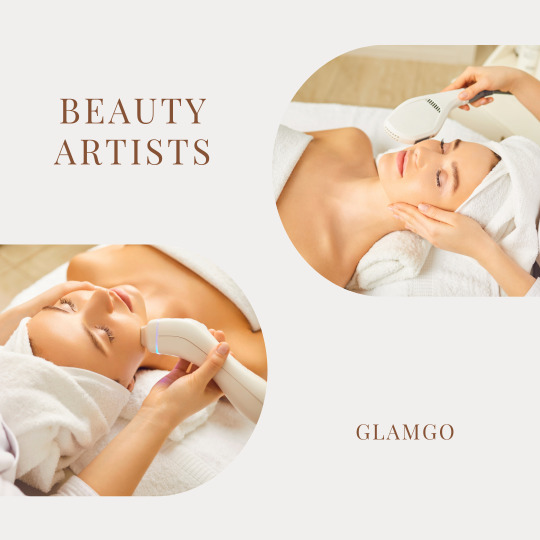
Achieving clear and glowing skin is a goal for many, and with the right skincare routine, it’s absolutely attainable. Whether you’re combating acne, dullness, or just seeking that radiant glow, following a structured routine can help transform your skin. Below are the essential steps to create a skincare routine that leaves your skin looking refreshed and healthy.
1. Cleansing Twice a Day
The foundation of any effective skincare routine starts with cleansing. Use a gentle cleanser suitable for your skin type to remove dirt, oil, and makeup. Cleansing twice a day, morning and night, ensures your skin stays free of impurities that can lead to breakouts. Look for best cleansers for sensitive skin to avoid irritation and maintain hydration.
2. Exfoliation for Clearer Skin
Exfoliating 2-3 times a week removes dead skin cells and reveals fresher skin underneath. Physical exfoliants (scrubs) or chemical exfoliants (like AHA or BHA) can smoothen the skin’s texture and unclog pores. Opt for best chemical exfoliants for acne-prone skin to address breakouts and keep your skin smooth.
3. Toning to Balance pH Levels
A toner helps to balance the skin’s pH and prepares it for better absorption of products. Look for toners with hydrating ingredients like hyaluronic acid or soothing agents like rose water. Choose best alcohol-free toners for a glowing complexion to ensure your skin remains balanced and hydrated.
4. Serums for Targeted Treatment
Serums are concentrated formulas that target specific skin concerns like pigmentation, wrinkles, or hydration. For glowing skin, Vitamin C serums are highly recommended, as they brighten the complexion and reduce dark spots. Explore top Vitamin C serums for radiant and youthful skin to enhance your glow and protect against environmental damage.
5. Moisturizing for Hydration
No skincare routine is complete without moisturizing. Even if you have oily skin, a lightweight, non-comedogenic moisturizer is essential to keep your skin hydrated and healthy. For dry skin, consider best moisturizers to combat dullness that contain ingredients like ceramides and glycerin for deeper hydration.
6. SPF for Protection
Sunscreen is a non-negotiable step in every skincare routine. It protects your skin from harmful UV rays that cause premature aging and hyperpigmentation. Choose best broad-spectrum sunscreens for everyday wear with SPF 30 or higher to safeguard your skin from sun damage.
Conclusion
Consistency is key when it comes to skincare. By following a tailored routine and using the right products for your skin type, you can achieve clear, glowing skin that lasts. For more beauty tips and product recommendations, visit Glamgo.
#best moisturizers to combat dullness#best broad-spectrum sunscreens for everyday wear#best alcohol-free toners for a glowing complexion#best chemical exfoliants for acne-prone skin#best cleansers for sensitive skin
0 notes
Text
Let’s Discuss The Benefits Of Switching To A Foaming Facewash | Uniqaya
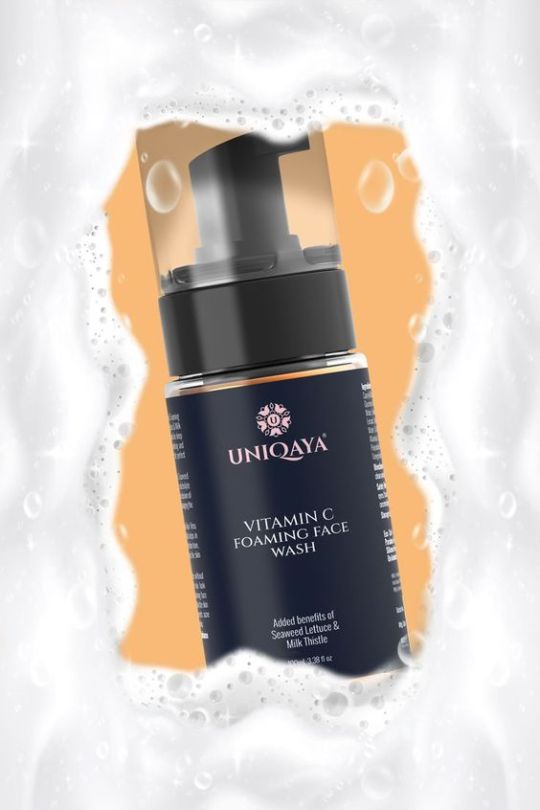
The holy grail of skincare actually includes not more than three steps, which are: Face Cleansing, moisturizing and Tinted sunscreen. Cleansing your skin is the first and the foremost step of a holistic skincare routine. The two types of face wash typically encountered are foam and regular gel-based face washes. This article seeks to explore how foaming face washes are way better than other face-washes:
A foaming Facewash cleanses your entire skin through thick lather. It is known to gently hydrate the skin and helps the skin get properly cleansed off from the dirt and impurities. A foaming Facewash is also known to exfoliate the skin and gives it a smooth, supple appearance. These kind of face washed are excellent for oily and combination skin types.
What one must know is that gel based face washes do not hydrate the skin as much as foaming face washes. Foaming face washes never dry the skin either, which is definitely a plus point.
UniQaya’s Vitamin C foaming face wash is enriched with the benefits of milk thistle and seaweed lettuce. It helps in optimally moisturizing, hydrating, and nourishing one’s skin. This foaming Facewash is further enriched with the benefits of Vitamin B5, Vitamin C, and the calendula flower extract. It help in deep cleansing the pores and eliminates dirt, impurities, grime, and pollutants. It will help control excess sebum, and surface buildup which eventually helps to prevent acne formation.
#sunscreen#buy tinted sunscreen spf 50#tinted sunscreen#benefits of tinted sunscreen spf 50#tinted sunscreen spf 50#best sunscreen for blue light#broad spectrum sunscreen spf 50#shop tinted sunscreen spf 50#shop broad spectrum sunscreen spf 50#broad spectrum tinted sunscreen#spf 50 sunscreen for face#sunscreen cream#sunscreen lotion#natural sunscreen#sunscreen spf 50#best tinted sunscreen#sunscreen for oily skin#best sunscreen for acne prone skin#best sunscreen for sensitive skin#uniqaya#uniqayalifestyle#naturalskincareindia#antipigment#healthyglow#naturalskin#antipimple#naturalskincaretips#hydratedskin#skinhydration#nightskincareroutine
0 notes
Text
The Basics of Skin Care
A 100 skincare tips for beginners:
Cleansing:
1. Cleanse your face twice a day.
2. Use a gentle, sulfate-free cleanser.
3. Avoid hot water, as it can strip natural oils.
4. Use a cleansing brush or washcloth for gentle exfoliation.
5. Remove makeup before bedtime.
6. Double cleanse if you wear heavy makeup.
7. Don't over-cleanse; it can lead to dryness.
Exfoliation:
8. Exfoliate 1-3 times a week, based on your skin type.
9. Choose chemical exfoliants like AHAs or BHAs.
10. Be gentle when physically exfoliating.
11. Avoid over-exfoliation to prevent irritation.
Moisturizing:
12. Use a moisturizer suitable for your skin type.
13. Apply moisturizer while your skin is slightly damp.
14. Don't forget your neck and chest.
15. Consider using a humidifier in dry climates.
Sun Protection:
16. Always wear sunscreen, even on cloudy days.
17. Use a broad-spectrum SPF of at least 30.
18. Reapply sunscreen every 2 hours.
19. Wear protective clothing and sunglasses.
20. Avoid tanning beds and excessive sun exposure.
Anti-Aging:
21. Use products with antioxidants like vitamin C.
22. Apply retinol at night for anti-aging benefits.
23. Consider peptides for collagen support.
24. Stay hydrated to maintain skin elasticity.
25. Get enough sleep for skin repair.
Hydration:
26. Drink plenty of water for overall skin health.
27. Use a hydrating serum or hyaluronic acid.
28. Avoid hot showers that can dry out your skin.
29. Limit alcohol and caffeine intake.
Acne Management:
30. Use salicylic acid for acne-prone skin.
31. Don't pop pimples; it can lead to scarring.
32. Change pillow cases regularly.
33. Maintain a balanced diet to reduce breakouts.
34. Consult a dermatologist for severe acne.
Skincare Routine:
35. Develop a consistent skincare routine.
36. Patch test new products.
37. Customize your routine based on your skin's needs.
38. Consider professional facials occasionally.
Makeup:
39. Clean makeup brushes and sponges regularly.
40. Avoid sharing makeup to prevent infections.
41. Choose non-comedogenic makeup products.
42. Remove makeup before going to bed.
Eye Care:
43. Use an eye cream to address under-eye concerns.
44. Be gentle when applying and removing eye makeup.
45. Get enough sleep to reduce under-eye puffiness.
Lifestyle:
46. Manage stress to prevent skin issues.
47. Get regular exercise for better blood flow.
48. Avoid smoking and secondhand smoke.
49. Limit alcohol consumption.
50. Eat a balanced diet rich in fruits and vegetables.
Special Treatments:
51. Use a face mask 1-2 times a week.
52. Try sheet masks for extra hydration.
53. Consider facial oils for added moisture.
54. Use a lip balm to prevent chapped lips.
Skin Conditions:
55. Consult a dermatologist for skin conditions.
56. Use products with soothing ingredients for sensitive skin.
57. Eczema-prone skin should avoid harsh products.
58. Rosacea-prone skin should use gentle, non-irritating products.
59. Psoriasis-prone skin may benefit from salicylic acid.
DIY Skincare:
60. Be cautious with DIY treatments; research first.
61. Natural ingredients like honey and aloe can be beneficial.
62. Avoid DIY recipes with harsh or abrasive ingredients.
63. Test DIY masks on a small area first.
Sleep:
64. Get 7-9 hours of sleep for skin regeneration.
65. Sleep on a silk or satin pillowcase to reduce friction.
Hands and Feet:
66. Moisturize hands and feet, especially in winter.
67. Use sunscreen on your hands to prevent age spots.
Body Skin Care:
68. Don't forget to moisturize your body.
69. Exfoliate your body regularly.
70. Take short, lukewarm showers to prevent dry skin.
Shaving:
71. Shave in the direction of hair growth.
72. Use a sharp, clean razor.
73. Apply a moisturizing shaving cream.
Hair Care:
74. Use a gentle shampoo and conditioner.
75. Avoid hot water when washing your hair.
76. Protect your hair from UV damage.
Hormonal Changes:
77. Adjust your skincare routine during hormonal changes.
78. Birth control can affect skin; consult a dermatologist.
79. Manage menopausal skin changes with skincare.
Allergies:
80. Be aware of allergens in skin care products.
81. Perform a patch test for new products.
82. Hypoallergenic products can be a safe choice.
Tattoo Care:
83. Follow aftercare instructions for tattoos.
84. Use a mild, fragrance-free lotion.
85. Avoid direct sunlight on a healing tattoo.
Skin Care Tools:
86. Cleanse skincare tools regularly.
87. Replace loofahs and brushes when they wear out.
Consult a Professional:
88. If you're unsure about a product, ask a dermatologist.
89. Consider professional treatments for specific concerns.
Inflammation:
90. Use products with anti-inflammatory ingredients.
91. Manage skin redness with calming products.
Massage:
92. Gently massage your face for better circulation.
93. Use upward motions to prevent sagging.
Eyes and Lips:
94. Use SPF lip balm to protect your lips.
95. Choose an eye cream with ingredients like caffeine.
Preventive Care:
96. Start a skincare routine early for preventive care.
97. Be patient; skincare results take time.
98. Embrace your natural beauty.
99. Avoid comparing your skin to others'.
100. Remember that skincare is individual; what works for one person may not work for another.
These tips can help you maintain healthy and radiant skin. However, always consult a dermatologist for personalized advice based on your skin's unique needs.
101 notes
·
View notes
Text
Step-by-Step Guide to a Complete Daily Skincare Routine for Glowing Skin
Achieving glowing, radiant skin is not just about using the right products but also about following a consistent daily skincare routine. Whether you’re new to skincare or looking to refine your routine, this guide will help you establish the perfect steps to get that luminous, healthy-looking skin you’ve always wanted.
Step 1: Cleanse Your Face (Morning and Night)
Cleansing is the foundation of any skincare routine. It removes dirt, excess oil, makeup, and impurities that accumulate on your skin throughout the day.
Morning: Use a gentle cleanser suited to your skin type. If you have oily skin, opt for a foaming or gel cleanser. Dry skin types may benefit from a hydrating cream cleanser.
Night: Double cleansing is recommended in the evening. Start with an oil-based cleanser to dissolve makeup and sunscreen, then follow up with your regular cleanser to ensure your skin is thoroughly clean.
Pro tip: Use lukewarm water to wash your face, as hot water can strip your skin of its natural oils, causing dryness and irritation.
Step 2: Apply a Toner
Toners help balance the skin’s pH level and remove any remaining traces of dirt or makeup. They also prep the skin for the next steps of your routine.
Choose the right toner: If you have oily or acne-prone skin, look for toners with salicylic acid or witch hazel. For dry or sensitive skin, opt for a hydrating toner with ingredients like rose water or glycerin.
How to apply: Use a cotton pad or your hands to gently pat the toner onto your skin.
Pro tip: Avoid toners with alcohol, as they can dry out your skin and cause irritation.
Step 3: Use a Serum
Serums are packed with active ingredients designed to target specific skin concerns. This is where you can tailor your skincare routine based on what your skin needs.
For glowing skin: Vitamin C serums are excellent for brightening and evening out skin tone. It’s also a powerful antioxidant that protects the skin from environmental damage.
For hydration: If your skin feels dry or dull, a serum with hyaluronic acid can deeply hydrate and plump your skin.
Pro tip: Apply your serum while your skin is still slightly damp from toner to help lock in hydration.
Step 4: Apply Eye Cream
The skin around the eyes is delicate and prone to dryness, fine lines, and puffiness. Incorporating an eye cream into your routine helps to address these issues.
For dark circles and puffiness: Look for eye creams with caffeine or peptides.
For fine lines and hydration: Hyaluronic acid or retinol-based eye creams are great for minimizing fine lines and keeping the under-eye area hydrated.
Pro tip: Use your ring finger to gently pat the eye cream around your eyes, as it exerts the least pressure.
Step 5: Moisturize
Moisturizing is crucial for keeping your skin hydrated and creating a protective barrier. A good moisturizer will seal in all the products you’ve applied in the previous steps.
For oily skin: Choose a lightweight, oil-free moisturizer, such as a gel or water-based product.
For dry skin: A richer, cream-based moisturizer will provide the necessary hydration.
Pro tip: Don’t skip moisturizing, even if you have oily skin. Proper hydration helps to regulate your skin’s oil production and prevent breakouts.
Step 6: Sunscreen (Morning Only)
Sunscreen is the most important step in your morning routine. Daily sun protection prevents premature aging, hyperpigmentation, and skin cancer.
Broad-spectrum SPF: Choose a broad-spectrum sunscreen with at least SPF 30 to protect against both UVA and UVB rays.
How to apply: Use about a nickel-sized amount and apply it evenly across your face and neck. Reapply every two hours if you’re outdoors.
Pro tip: If you’re using makeup, look for a moisturizer or foundation with built-in SPF for added protection.
Step 7: Exfoliate (1-2 Times a Week)
Exfoliation is essential for removing dead skin cells that can make your skin look dull and clog your pores. However, over-exfoliating can irritate your skin, so limit this step to once or twice a week.
For physical exfoliation: Use a gentle scrub with fine particles to buff away dead skin cells.
For chemical exfoliation: A chemical exfoliant containing AHA (alpha hydroxy acid) or BHA (beta hydroxy acid) can effectively slough off dead skin without being abrasive.
Pro tip: Always follow exfoliation with a good moisturizer, as exfoliation can leave your skin feeling dry or tight.
Step 8: Face Mask (1-2 Times a Week)
A face mask is a great addition to your skincare routine, especially when your skin needs an extra boost. Face masks can target various skin concerns, from hydration to deep cleansing.
For glowing skin: Look for masks with ingredients like Vitamin C, turmeric, or honey that brighten the complexion.
For hydration: A mask with hyaluronic acid or aloe vera can soothe and replenish dry skin.
Pro tip: Apply your face mask after cleansing and before moisturizing to get the most benefit from the ingredients.
Additional Tips for Glowing Skin:
Stay hydrated: Drinking plenty of water is key to keeping your skin hydrated from the inside out. Aim for at least 8 glasses of water a day.
Eat a balanced diet: Incorporating foods rich in antioxidants, such as berries, leafy greens, and nuts, can help promote healthy, glowing skin.
Get enough sleep: Aim for 7-9 hours of sleep each night to allow your skin to repair and rejuvenate. Lack of sleep can lead to dull, tired-looking skin.
Don’t skip SPF: Sun damage is one of the leading causes of premature aging. Wearing sunscreen daily is crucial for maintaining youthful, glowing skin.
Consistency is key: Stick to your skincare routine every day, and be patient. It can take a few weeks to see noticeable improvements, but consistency will pay off.
Conclusion
A daily skincare routine doesn’t have to be complicated to be effective. By following these simple steps—cleanse, tone, treat, moisturize, and protect—you can achieve glowing, radiant skin that looks and feels healthy. Tailor your routine to your skin’s specific needs, and remember to be consistent for long-lasting results.
7 notes
·
View notes
Text
Fresh Start: A Teenage Girl’s Clean Hygiene Routine
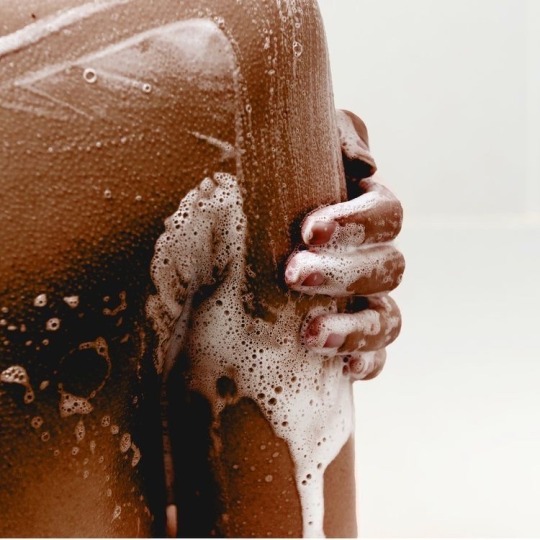
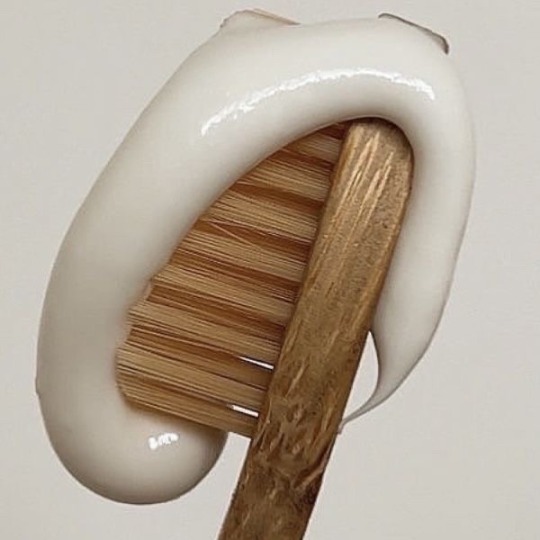
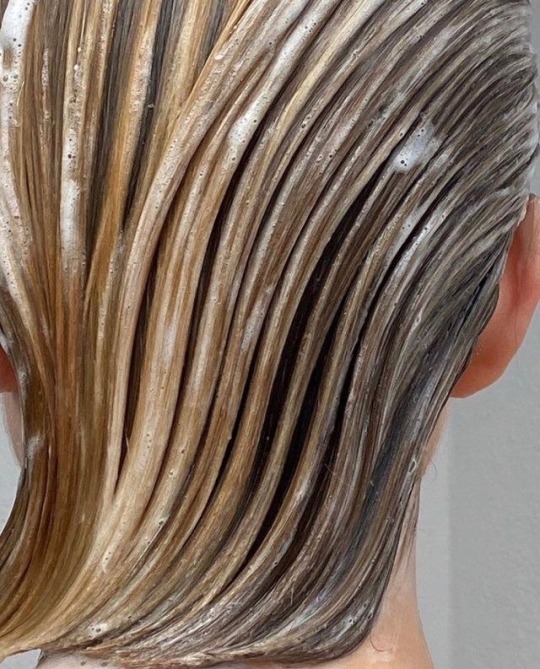
Maintaining good hygiene is essential for teenage girls and young women to feel confident, healthy, and empowered. Here's a comprehensive clean hygiene routine tailored specifically for us:
1. Daily Shower or Bath:
- Use a mild, pH-balanced body wash or soap to cleanse the entire body, paying extra attention to areas prone to sweat and odor, such as underarms and feet.
- Gently exfoliate the skin 2-3 times a week to remove dead skin cells and prevent clogged pores.
- Rinse thoroughly with lukewarm water to avoid stripping the skin of its natural oils.
2. Hair Care:
- Wash hair 2-3 times a week with a sulfate-free shampoo suitable for your hair type (dry, oily, curly, etc.).
- Use a conditioner after shampooing to moisturize and detangle hair, focusing on the ends.
- Limit the use of heat styling tools and protect hair from damage by using a heat protectant spray before styling.
- Trim split ends regularly to maintain healthy hair growth.
3. Facial Cleansing:
- Wash your face twice daily, morning and night, with a gentle facial cleanser suitable for your skin type (dry, oily, combination, sensitive, acne-prone, etc.).
- Use lukewarm water and avoid harsh scrubbing, which can irritate the skin.
- Apply a non-comedogenic moisturizer after cleansing to hydrate the skin and prevent dryness.
4. Dental Care:
- Brush teeth at least twice a day, morning and night, using fluoride toothpaste and a soft-bristled toothbrush.
- Floss daily to remove plaque and food particles from between teeth and along the gum line.
- Rinse with an alcohol-free mouthwash for added freshness and to kill bacteria.
- Visit the dentist for regular check-ups and professional cleanings every six months.
5. Feminine Hygiene:
- Change sanitary pads or tampons every 4-6 hours during menstruation to maintain freshness and prevent odor.
- Wash the genital area with a mild, fragrance-free soap and water daily, paying attention to hygiene during menstruation.
- Use breathable cotton underwear and avoid tight-fitting clothing to promote air circulation and prevent moisture buildup.
6. Nail Care:
- Keep nails trimmed and filed to prevent breakage and maintain a neat appearance.
- Clean under the nails regularly to remove dirt and bacteria.
- Apply a moisturizing hand cream to keep hands soft and hydrated.
- Avoid biting or picking at nails and cuticles to prevent infection and damage.
7. Deodorant and Antiperspirant:
- Apply a deodorant or antiperspirant daily to underarms to control sweat and odor.
- Choose a product that suits your body's needs and preferences, whether it's a roll-on, stick, or spray.
8. Sun Protection:
- Apply a broad-spectrum sunscreen with an SPF of at least 30 to exposed skin daily, even on cloudy days.
- Reapply sunscreen every 2 hours, especially if swimming or sweating heavily.
- Wear protective clothing, such as hats and sunglasses, and seek shade during peak sun hours to minimize sun exposure.
Remember, good hygiene goes beyond physical cleanliness—it also involves taking care of your mental and emotional well-being. Practice self-care, prioritize sleep, eat a balanced diet, stay hydrated, and engage in activities that bring you joy and fulfillment. By incorporating these habits into your daily routine, you'll not only look and feel your best but also cultivate a healthy lifestyle for years to come.
Here's a list of products for a hygiene routine that are healthy , affordable ,cruelty free, vegan ,non comedogenic , no alcohol , no fragrance and that doesn’t support genocide:
1. Daily Shower or Bath:
- Cleanser: CeraVe Hydrating Body Wash
- Moisturizer: Vanicream Moisturizing Cream
- Sunscreen: EltaMD UV Clear Broad-Spectrum SPF 46
2. Hair Care:
- Shampoo: Acure Simply Smoothing Coconut & Marula Shampoo
- Conditioner: Desert Essence Fragrance-Free Conditioner
3. Facial Cleansing:
- Cleanser: CeraVe Hydrating Facial Cleanser
- Moisturizer: Vanicream Moisturizing Cream
4. Dental Care:
- Toothpaste: Hello Oral Care Fluoride-Free Whitening Toothpaste
- Mouthwash: Desert Essence Natural Refreshing Tea Tree Oil Mouthwash
5. Feminine Hygiene:
- Menstrual Cups: DivaCup Model 1 or Model 2
- Menstrual Pads: Natracare Ultra Pads with Wings
- Tampons: Cora Organic Cotton Tampons
6. Nail Care:
- Nail Clippers: Tweezerman Stainless Steel Nail Clipper
- Nail File: OPI Crystal Nail File
7. Deodorant and Antiperspirant:
- Deodorant: Schmidt's Fragrance-Free Sensitive Skin Deodorant
8. Sun Protection:
- Sunscreen: EltaMD UV Clear Broad-Spectrum SPF 46
9. Oral Care:
- Toothpaste: Hello Oral Care Fluoride-Free Whitening Toothpaste
- Dental Floss: Radius Vegan Xylitol Dental Floss
10. Body Care:
- Body Wash: Alaffia Everyday Shea Body Wash
- Body Lotion: Everyone Unscented 3-in-1 Lotion
Remember to always check the ingredient lists and certifications to ensure they align with your values and preferences. Additionally, prices and availability may vary depending on location and retailer.
13 notes
·
View notes
Text
SKIN1004 Madagascar Centella Tea-Trica Soothing Sun Milk SPF50+






SKIN1004 Madagascar Centella Tea-Trica Soothing Sun Milk SPF50+ provides high broad-spectrum sun protection while being gentle on the skin. Its lightweight, milky texture spreads easily and absorbs quickly, leaving no white cast, making it suitable for all skin tones. Infused with Centella Asiatica and tea tree extract, this sunscreen not only shields against UV rays but also calms and soothes the skin, making it ideal for sensitive or acne-prone skin. I appreciate its non-greasy finish and subtle, refreshing scent, I enjoying its comfortable wear and effective protection throughout the day.
https://www.instagram.com/p/C-Sx11ii2wW/?igsh=MWt1MGxkaGszNDg3aw==
@go_picky @pickyrewards @skin1004_jp #pickyreview #gopicky #skin1004 #skincare #skincareproducts #skincarereview #koreanskincareproducts #contentcreator #ugc #ugccreator #ugcCommunity
#black male#review#beardie#dark skin#skincare#freebies#male grooming#skincare tips#men skin care#skincare products#mens skincare#skincare routine#skincare review
3 notes
·
View notes
Text
Is it Safe to apply sunscreen directly on the face without using moisturizer?
Sunscreen is an essential skincare product that helps protect your skin from harmful UV rays that can cause skin damage, premature aging, and even skin cancer. Applying sunscreen is crucial, especially if you spend a lot of time outdoors or have sensitive skin. But the question is, can you apply sunscreen directly on your face without using moisturizer? Let's find out.
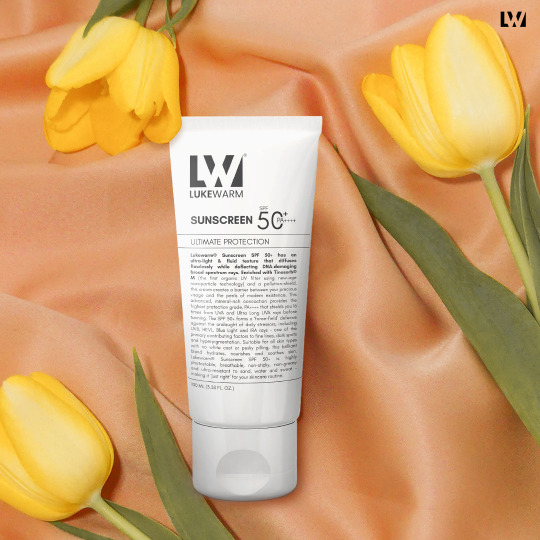
Sunscreen vs. Moisturizer
Sunscreen and moisturizer are two different skincare products that serve different purposes. Sunscreen is designed to protect skin from the sun's harmful UV rays, while moisturizer is designed to hydrate and nourish your skin. However, some moisturizers also contain sunscreen, which makes them a two-in-one product.
If you're using a moisturizer with SPF, you can apply it directly to your face without using a separate sunscreen. However, if you're using a standalone sunscreen, you may wonder if it's safe to apply it directly on your face without using moisturizer.
Is It Safe to Apply Sunscreen Directly on Your Face?
Yes, it is safe to apply sunscreen directly on your face without using moisturizer. Sunscreen is designed to protect your skin from the sun's harmful UV rays, and it does not require any other skincare product to be effective. However, if you have dry skin, it's a good idea to use a moisturizer before applying sunscreen. Moisturizer can provide additional hydration to the skin and help prevent dryness or irritation that may occur from using sunscreen alone.
It's important to choose a sunscreen that is suitable for your skin type and provides broad-spectrum protection against both UVA and UVB rays. Look for a sunscreen with an SPF of at least 30, and apply it generously to your face and neck 15 minutes before going outside. Reapply sunscreen every two hours or immediately after swimming or sweating.
Introducing Lukewarm sunscreen, a revolutionary product that acts as both a moisturizer and a sunscreen. This product is designed to replace your moisturizer, providing your skin with hydration without clogging your pores. With an SPF of 50+, lukewarm sunscreen offers powerful protection against broad-spectrum rays that can damage your skin's DNA. Its ultra-light and fluid texture glides on effortlessly, delivering eternal hydration to your skin. This product is a game-changer in the world of skincare, offering a simple and effective way to protect and nourish your skin at the same time.

Using Lukewarm mineral Sunscreen alone can have its benefits. Lukewarm Sunscreen is lightweight and can be quickly absorbed into the skin, making it ideal for those with oily or acne-prone skin. Additionally, using a separate moisturizer and sunscreen can sometimes lead to pilling or caking on the skin, which can be frustrating and may decrease the effectiveness of both products.
To decide whether to use sunscreen alone or with moisturizer, it is essential to consider your skin type and needs. If you have oily or acne-prone skin, using a lightweight sunscreen without moisturizer may be the best option. If you have dry or sensitive skin, using a moisturizer before applying sunscreen can help provide added hydration and nourishment to the skin.
Using sunscreen directly on the face without moisturizer is safe and effective. However, it is crucial to consider your skin type and needs when deciding whether to use sunscreen alone or with moisturizer. Ultimately, finding the right combination of products that works best for your skin can help keep it healthy and protected from harmful UV rays.
#lukewarm#mineral sunscreen#lukewarmmineralsunscreen#sunscreen#skincare#acne#skincare tips#lukewarmsunscreen
3 notes
·
View notes
Text
🌞🛍️ The Right Choice of Products for Your Summer Skin Care Routine! 🌺✨

Greetings, TUMBLR community! As we continue our journey through the world of "Summer Skin Care Routine," it's time to talk about the importance of choosing the right products for your skin during this sunny season. Let's dive in!
☀️ When it comes to your summer skin care routine, selecting the right products is essential for achieving a healthy and vibrant complexion. From cleansers to moisturizers and sunscreens, each product should be carefully chosen to address your skin's unique needs and protect it from the summer elements. 🛍️💧
🌿 To start, let's focus on cleansers. Opt for a gentle and refreshing facewash that suits your skin type. Whether you have oily, dry, or combination skin, choosing a cleanser with the right ingredients will help you achieve a clear and radiant complexion. Remember, a clean canvas sets the stage for healthy skin! 🧼💦
🌸 Moving on to moisturizers, it's crucial to choose lightweight and non-greasy formulas that provide hydration without weighing down your skin. Look for nourishing ingredients like hyaluronic acid or aloe vera, which replenish and lock in moisture, leaving your skin plump and supple. Stay hydrated and keep that summer glow!
☀️ Now, let's talk about sun protection. Don't leave home without applying a broad-spectrum sunscreen with an SPF of 30 or higher. Shielding your skin from harmful UV rays is vital in preventing sunburn, premature aging, and skin damage. Protect your skin and enjoy the summer sunshine with confidence! 🌞🌿
💡 Remember, everyone's skin is unique, so it's essential to consider your specific skin type when selecting products. Whether you have sensitive skin, acne-prone skin, or mature skin, there are suitable products out there to meet your needs. Embrace the power of tailored skincare!
✅ Join us on this journey to discover the perfect products for your summer skin care routine. Stay tuned for more valuable insights and recommendations in our "Summer Skin Care Routine" series. Follow us now and make your skin care choices wisely for a radiant summer glow! 🌺🛍️
Are you 💁♀️ tired of using skincare products loaded with chemicals? Switch to NatureNova Herbals 🌿 and discover the beauty of natural ingredients. Our herbal beauty products are carefully formulated to be paraben ❌ and sulfate-free, providing your skin with the gentle care it needs. Experience the added goodness 👌 of vitamin C and E for a truly rejuvenating skincare experience. 🛍
👉 Don't miss out! Follow us today for expert guidance on selecting the right products for your summer skin care routine. Let your skin shine all summer long! 🌞🛍️
#beauty#beauty products#skin care#skincareproducts#skincare tips#facewash#face serum#face pack#face scrub#face toner#sunscreen#beauty tips#vitamin c#acne
3 notes
·
View notes
Text
SPF, UVA, and UVB, Oh My! A Beginner's Guide to Sunscreen for Your Face
When it comes to choosing the best sunscreen for your face, it’s not a case of just what SPF you’ll need. More than that, today’s sunscreens can be physical or chemical, and some will offer broad-spectrum protection. Modern formulations can even offer skincare benefits tailored to your skin type, and blend make-up with advanced sun protection. Read on to make sense of it all, and find out how to choose a product that’s right for you.
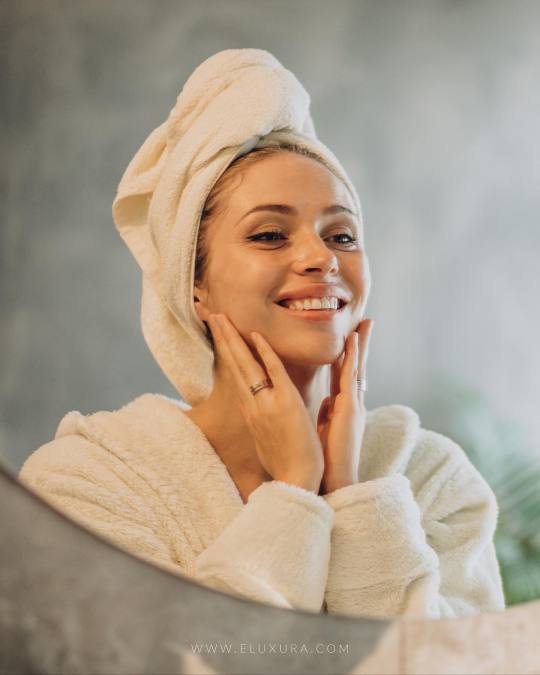
How Do I Choose the Right Sunscreen?
The SPF factor of a sunscreen is a good place to start when choosing your sun protection product. A sunscreen’s Sun Protection Factor indicates how much longer it would take for the sun to redden the skin vs no protection. It is recommended to use a minimum of SPF30 on the face every day, even if the sun isn’t shining. SPF30 offers up to 97% protection against UV rays, and provides a good baseline for everyday needs.
For more intense sun exposure, if you’re lucky enough to be sunbathing or out in strong direct sunlight, it’s wise to hit the SPF50. SPF50 is also recommended if you’ve experienced sun damage in the past, or if you have a history of skin cancer. SPF50 allows 50% less UV radiation through than SPF30, and that extra protection makes a real difference on a sunny day.
Modern high-tech skincare will often come with SPF built in, so look for ones designed to suit your skin type for extra benefits. Oily skin will benefit from mattifying products, while moisturising sunscreens will suit drier skin. Most of us appreciate some anti-ageing benefits, and happily there exist plenty of sunscreens packed with ingredients to keep skin looking young!
UVA vs UVB- Why does Broad-Spectrum Matter?
While SPF describes how long before your skin reddens in the sun, that’s only half the story. The two types of Ultraviolet rays have different effects and capabilities, and broad-spectrum sunscreen is required to protect against both.
UVB rays are primarily responsible for skin reddening and burning, and SPF ratings are based upon preventing this. These shorter UV rays are easily filtered physically, and can be blocked by glass. Their intensity fluctuates, being strongest in the middle of the day.
UVA rays by contrast are longer and more deeply penetrating rays, getting through clouds and windows at consistent levels throughout daylight hours. They penetrate skin far more deeply than UVB rays, causing tanning but also genetic changes to cells which result in certain skin cancers. UVA light is responsible for prematurely ageing the skin, triggering sun spots and solar elastosis, where the skin goes leathery.
Opting for a broad-spectrum sunscreen ensures that you’re protected from the harmful effects of both UVA and UVB rays.
Chemical vs Physical Sunscreens- What’s the Difference?
A physical sunscreen reflects and physically blocks the harmful UV rays of the sun. They are typically mineral-based, using ingredients like zinc oxide and titanium dioxide. While old-style physical sunscreens could often look chalky, modern formulations use microparticles to ensure no residue and an even application.
Since physical sunscreens sit atop the skin creating a physical barrier, they risk triggering breakouts in people prone to acne. They do need to be reapplied throughout the day, as that barrier can wear thin, especially after swimming or washing.
People with more reactive or sensitive skin types tend to prefer mineral-based sunscreens and tolerate them better. But current generations of chemical sunscreens are advanced enough that even sensitive skin types can enjoy them free of irritation. They work by absorbing UV rays, essentially converting them to heat before releasing it from your skin. As they don’t sit on the surface of the skin like physical sunscreens, chemical sunscreens also need to be reapplied less frequently.
How to Apply your Sunscreen
Of course, choosing the best sunscreen for your face isn’t going to help much if it’s not applied properly! Before going outside, apply a generous amount onto clean skin, making sure to remember your neck, chest, and ears. Allow it to absorb for a minimum of 30 seconds, ideally longer, before applying any make-up. Use up any excess on the backs of your hands, as these face constant exposure to the elements.
A chemical sunscreen should be applied before using any moisturiser, as it needs to be absorbed into the skin. Physical sunscreens on the other hand need to sit on the surface of the skin, so moisturise first and let it sink well in before applying your sun protection.
Dermatologists recommend you reapply your sunscreen every 2 hours when in direct sunlight, and every 3-4 hours otherwise. After activities like swimming, strenuous workouts, or washing you should also reapply, as these can compromise the level of protection.
Sunshine can lift everyone’s mood, bringing joy and vibrancy to life. By choosing the right SPF to best protect your skin, you can ensure you enjoy the sunlight and all its benefits safe from harm. And if you're looking for a reliable and effective sunscreen, look no further than ELUXURA. Visit their website today and discover their range of beauty products, including sunscreens and everything you need to keep your skin healthy, glowing, and protected from the sun's harmful rays.
2 notes
·
View notes
Text
Niacinamide vs. Acne: A Game-Changing Ingredient for Clear Skin
Acne is a persistent issue for people of all ages. From frustrating breakouts to stubborn scars, finding the right treatment can feel like a never-ending journey. Fortunately, niacinamide—a trending skincare ingredient—has emerged as a gentle yet effective solution for acne-prone skin. But how exactly does it work, and why is it a must-have in your skincare routine? Let’s explore.
What is Niacinamide?
Niacinamide, also known as vitamin B3, is a water-soluble vitamin that has gained recognition for its ability to address a wide range of skin concerns. Found in serums, moisturizers, and even cleansers, it’s praised for its versatility and suitability for all skin types. Unlike some acne treatments that can dry or irritate the skin, niacinamide works harmoniously to support your skin's overall health while targeting breakouts.
How Niacinamide Fights Acne
Here’s why niacinamide is considered a game-changer for acne:\n\n1. Balances Oil Production: One of the root causes of acne is excess sebum, which clogs pores and leads to breakouts. Niacinamide regulates sebum production, preventing oiliness without over-drying the skin.\n\n2. Soothes Inflammation: Acne often comes with redness, swelling, and discomfort. Thanks to its anti-inflammatory properties, niacinamide helps calm irritated skin, making it ideal for managing inflammatory acne types like cysts or pustules.\n\n3. Improves Skin Barrier Function: A damaged skin barrier makes your skin more vulnerable to acne-causing bacteria and irritants. Niacinamide strengthens the barrier, ensuring your skin stays hydrated and protected.\n\n4. Fades Post-Acne Marks: Stubborn dark spots and hyperpigmentation can linger long after a breakout heals. Niacinamide reduces discoloration by inhibiting melanin transfer, promoting a more even skin tone.\n\n5. Reduces Pore Appearance: By balancing oil production and improving skin elasticity, niacinamide can minimize the appearance of enlarged pores, a common concern for acne-prone individuals.\n\n---
How to Use Niacinamide for Acne
Incorporating niacinamide into your skincare routine is simple and effective. Here’s how to do it:\n\n1. Find the Right Product: Look for niacinamide serums or moisturizers with concentrations between 2-10%. Most people find 5% to be effective without irritation.\n\n2. Apply After Cleansing: Use niacinamide products after cleansing and before applying thicker creams or sunscreens. This ensures maximum absorption.\n\n3. Pair with Other Ingredients: Niacinamide works well with other skincare staples like hyaluronic acid, zinc, and retinol. However, avoid using it simultaneously with pure vitamin C, as it can reduce the effectiveness of both ingredients.\n\n4. Be Consistent: Use niacinamide once or twice daily. It’s gentle enough for regular use and complements both morning and evening routines.\n\n5. Always Use Sunscreen: To maximize niacinamide’s benefits and prevent further acne-related discoloration, pair it with a broad-spectrum sunscreen during the day.\n\n---
When Will You See Results?
Niacinamide is effective, but patience is key. You may start noticing improvements in skin texture and reduced redness within 4 weeks. For significant changes like fading dark spots and minimizing breakouts, give it 8-12 weeks of consistent use.
Why Choose Niacinamide?
Unlike harsher treatments like benzoyl peroxide or salicylic acid, niacinamide is gentle on the skin. It doesn’t cause peeling, dryness, or irritation, making it suitable for sensitive skin. Its ability to address multiple skin concerns—acne, discoloration, oiliness, and more—makes it a well-rounded choice for anyone striving for clear, balanced skin.
0 notes
Text
Shop Uniqaya Tinted Sunscreen | The Best Sunscreen for All Skin Types
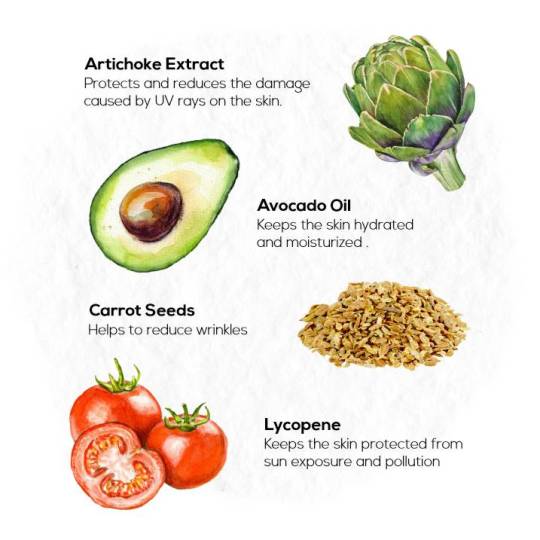
Sun & Screen Full Protection Broad Spectrum Tinted Sunscreen with SPF 50 PA+++, 50 gm is all that you need to protect yourself from the rays of the sun. It’s a complete solution for optimal protection from the UVA, UVB and blue rays which are emitted from the digital smartphones and digital screens. Furthermore, This broad spectrum tinted sunscreen comes with an SPF of 50, which further provides maximum protection to your skin from the sun damage. The broad-spectrum formula effectively blocks the harmful UVA and UVB rays, thus preventing premature aging and sunburn.
#sunscreen#buy tinted sunscreen spf 50#tinted sunscreen#benefits of tinted sunscreen spf 50#tinted sunscreen spf 50#best sunscreen for blue light#broad spectrum sunscreen spf 50#shop tinted sunscreen spf 50#shop broad spectrum sunscreen spf 50#broad spectrum tinted sunscreen#spf 50 sunscreen for face#sunscreen cream#sunscreen lotion#natural sunscreen#sunscreen spf 50#best tinted sunscreen#sunscreen for oily skin#best sunscreen for acne prone skin#best sunscreen for sensitive skin
0 notes
Text
Best Sunscreen Skin Care Products for All-Day Protection and Radiant Skin
Protecting your skin from harmful UV rays is essential for maintaining a healthy, glowing complexion. The best sunscreen skin care products offer more than just sun protection they also nourish and hydrate, keeping your skin radiant throughout the day. Whether you have sensitive, oily, or dry skin, there’s a sunscreen formulated to meet your needs. These top-rated sunscreens combine broad-spectrum protection with lightweight, non-greasy formulas that won’t clog pores. With added antioxidants and moisturizing ingredients, they provide all-day defense against the sun while promoting a smoother, more even skin tone. Choose the right sunscreen for your skin type to stay protected and radiant year-round.
Broad-Spectrum Protection Shield Your Skin from Harmful UV Rays Sunscreen Skin Care Products
A good sunscreen skin care products should offer broad-spectrum protection, guarding your skin against both UVA and UVB rays. UVA rays cause premature aging, wrinkles, and skin cancer, while UVB rays are responsible for sunburn. To protect your skin throughout the day, opt for sunscreens with SPF 30 or higher, ideally designed to provide a physical barrier like zinc oxide or titanium dioxide. These ingredients sit on the skin’s surface and reflect UV rays, offering long-lasting protection even in harsh sunlight, making them an essential part of your daily skincare routine.
Hydrating Formulas for Soft, Moisturized Sunscreen Skin Care Products
A sunscreen skin care products that also hydrates your skin is an ideal choice for daily wear. Look for formulas enriched with moisturizing ingredients like hyaluronic acid, glycerin, or aloe vera. These components help lock in moisture, leaving your skin feeling soft, smooth, and nourished while ensuring it stays protected from the sun’s rays. Hydrating sunscreens can work double duty, providing essential moisture to combat dryness caused by sun exposure while giving you all-day defense from harmful UV rays. This makes them a great pick for those with dry or sensitive skin.
Anti-Aging Benefits Protect and Preserve Your Youthful Glow Sunscreen Skin Care Products
Sunscreen skin care products is a key ally in preventing the visible signs of aging. Prolonged sun exposure accelerates the breakdown of collagen and elastin, leading to sagging skin, wrinkles, and age spots. Choose sunscreens that are fortified with antioxidants like vitamin C, vitamin E, or niacinamide, which help neutralize free radicals generated by UV exposure. These ingredients not only protect your skin from the sun but also help preserve your youthful complexion by reducing the visible effects of sun damage. Anti-aging sunscreens provide both immediate and long-term benefits for radiant, healthy skin.
Non-Greasy, Lightweight Formulas for All-Day Comfort Sunscreen Skin Care Products
The best sunscreen skin care products should feel comfortable on the skin, without leaving behind a heavy, greasy residue. For an all-day protective experience, opt for lightweight, non-comedogenic formulas that absorb quickly and feel invisible on the skin. Gel-based or water-based sunscreens are perfect for those with oily or acne-prone skin, as they don’t clog pores or leave a shiny finish. These sunscreens offer protection without feeling like you’re wearing a layer of product, making them ideal for daily use, especially under makeup or during physical activities.
Water-Resistant Sunscreen Skin Care Products for Active Lifestyles
If you enjoy outdoor activities like swimming, hiking, or sports, you’ll need a sunscreen that can keep up with your active lifestyle. Look for water-resistant sunscreen skin care products that provide lasting protection, even when you sweat or get wet. Water-resistant formulas are designed to stay intact on the skin for longer periods, ensuring continuous UV defense even after swimming or intense physical activity. These sunscreens are perfect for a day at the beach, a run in the park, or any other activity where your skin needs reliable protection from both water and sun.
Mineral Sunscreen Skin Care Products Safe and Effective for Sensitive Skin
Mineral sunscreen skin care products,also known as physical sunscreens, offer a safer, more gentle option for those with sensitive skin. These sunscreens contain mineral ingredients like zinc oxide and titanium dioxide, which work by physically blocking UV rays from reaching the skin. They are less likely to cause irritation or allergic reactions compared to chemical sunscreens. Mineral-based sunscreens are a great choice for individuals with conditions such as rosacea, eczema, or acne, as they provide all-day protection without compromising skin health. They are also eco-friendly, often free from harmful chemicals that can harm marine life.
Tinted Sunscreen Skin Care Products Double Protection and Even Skin Tone
Tinted sunscreen skin care products not only provide all-day sun protection but also help even out your skin tone by offering a subtle, natural-looking tint. The added tint helps protect your skin from visible light, which can contribute to pigmentation and hyperpigmentation. Tinted formulas are especially beneficial for those with darker skin tones, as they can help prevent the development of dark spots while offering sun protection. These sunscreens also work well as a base for makeup or as a standalone product, providing an additional layer of defense while enhancing your skin’s appearance.
Conclusion
Choosing the best sunscreen skin care products is essential for maintaining healthy, radiant skin throughout the day. With the right sunscreen, you not only protect your skin from harmful UV rays but also prevent premature aging and sun damage. Look for broad-spectrum formulas that offer both UVA and UVB protection, while also hydrating and nourishing the skin. Whether you're outdoors or indoors, the best sunscreen should blend seamlessly into your daily routine, providing all-day protection without feeling heavy. Invest in quality sunscreen products to safeguard your skin and achieve a glowing, youthful complexion for years to come.
0 notes
Text
Seasonal Skincare Tips: Best Natural Products for Summer and Winter
Seasonal skincare is essential for maintaining healthy and glowing skin throughout the year. Both summer and winter present unique challenges to the skin, requiring specific care routines and natural products. Understanding these seasonal changes can help you choose the right products that cater to your skin’s needs while maintaining its natural balance.
During the summer, the skin tends to produce more oil due to the heat, and this can lead to clogged pores and breakouts. The key to maintaining healthy skin in the summer is to keep it clean and hydrated. Natural ingredients like aloe vera, tea tree oil, and witch hazel are excellent for soothing sunburns and controlling oil production. Aloe vera is known for its cooling properties and ability to hydrate the skin, making it a must-have ingredient in your summer skincare routine. Tea tree oil has antimicrobial properties that help in managing acne, which is more common during hot and humid conditions. Witch hazel, a natural astringent, can be used to tone the skin and tighten pores.
Exfoliation is also crucial in the summer to remove dead skin cells that can clog pores. Opt for gentle exfoliants made with natural ingredients such as sugar or ground oats. These natural exfoliants can buff away dead skin without causing irritation, leaving your skin soft and smooth.
On the other hand, winter brings colder temperatures and lower humidity levels, which can lead to dry, flaky, and irritated skin. The skin’s moisture barrier is compromised during this season, making it more prone to dehydration and sensitivity. To combat this, the focus should be on deeply hydrating and nourishing the skin.
Natural oils such as jojoba oil, argan oil, and coconut oil are excellent for moisturizing the skin during winter. Jojoba oil mimics the skin’s natural oils and is easily absorbed, making it a perfect moisturizer for dry skin. Argan oil is rich in antioxidants and essential fatty acids, which help to repair and hydrate the skin, while coconut oil provides intense moisture and can help treat chapped lips and dry patches on the skin.
A thick, nourishing moisturizer or body butter made from natural butters like shea butter or cocoa butter can create a protective layer on the skin, preventing moisture loss and promoting skin elasticity. These ingredients are particularly effective during the colder months, as they help lock in moisture, keeping the skin smooth and supple.
In addition to these products, it’s important to incorporate natural sunscreen into both your summer and winter skincare routines. Sunscreen helps protect the skin from harmful UV rays, which can cause premature aging, pigmentation, and skin cancer. Opt for natural, mineral-based sunscreens with ingredients like zinc oxide, which offer broad-spectrum protection without the use of harsh chemicals.
For individuals looking to develop their own skincare line or improve their product formulations, working with a cosmetic manufacturer or a company specializing in cosmetic formulation services can help bring your ideas to life. A white label cosmetic manufacturer or a cosmetic contract manufacturing partner can provide customized solutions tailored to the unique needs of your product line, ensuring that your products meet high-quality standards while using the best natural ingredients.
0 notes